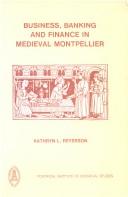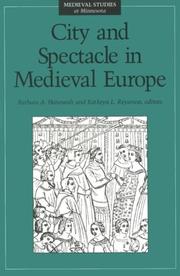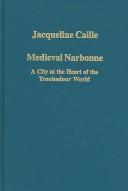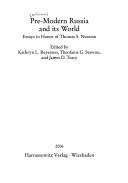| Listing 1 - 8 of 8 |
Sort by
|
Book
ISBN: 3319389416 3319389424 Year: 2016 Publisher: Cham : Springer International Publishing : Imprint: Palgrave Macmillan,
Abstract | Keywords | Export | Availability | Bookmark
 Loading...
Loading...Choose an application
- Reference Manager
- EndNote
- RefWorks (Direct export to RefWorks)
This book illuminates the connections and interaction among women and between women and men during the medieval period. To do this, Kathryn L. Reyerson focuses specifically on the experiences of Agnes de Bossones, widow of a changer of the mercantile elite of Montpellier. Agnes was a real estate mogul and a patron of philanthropic institutions that permitted lower strata women to survive and thrive in a mature urban economy of the period before 1350. Notably, Montpellier was a large urban center in southern France. Linkages stretched horizontally and vertically in this robust urban environment, mitigating the restrictions of patriarchy and the constraints of gender. Using the story of Agnes de Bossones as a vehicle to larger discussions about gender, this book highlights the undeniable impact that networks had on women’s mobility and navigation within a restrictive medieval society.
History. --- France --- Europe --- Literature, Medieval. --- History of Medieval Europe. --- Medieval Literature. --- History of France. --- History—476-1492. --- Women --- History --- Social networks --- Human females --- Wimmin --- Woman --- Womon --- Womyn --- Females --- Human beings --- Femininity --- Europe-History-476-1492. --- France-History. --- European literature --- Medieval literature --- Europe—History—476-1492. --- France—History. --- Gay culture Europe --- 476-1492.
Book
ISBN: 9780812249613 0812249615 0812294505 9780812294507 Year: 2018 Publisher: Philadelphia, Pennsylvania : University of Pennsylvania Press,
Abstract | Keywords | Export | Availability | Bookmark
 Loading...
Loading...Choose an application
- Reference Manager
- EndNote
- RefWorks (Direct export to RefWorks)
In the late 1320s, Martha de Cabanis was widowed with three young sons, eleven, eight, and four years of age. Her challenges would be many: to raise and train her children to carry on their father's business; to preserve that business until they were ready to take over; and to look after her own financial well-being. Examining the visible trail Martha left in Montpellier's notarial registers and other records, Kathryn L. Reyerson reveals a wealth of information about her activities, particularly in the area of business, commerce, and real estate. From these formal, contractual documents, Reyerson gleans something of Martha's personality and reconstructs what she may have done, and a good deal of what she actually did, in her various roles of daughter, wife, mother, and widow. Mother and Sons, Inc. demonstrates that while women were hardly equal to men in the fourteenth century, under the right conditions afforded by wealth and the status of widowhood, they could do and did more than many have thought. Within the space of twenty years, Martha developed a complex real estate fortune, enlarged a cloth manufacturing business and trading venture, and provided for the support and education of her sons. Just how the widow Martha maneuvered within the legal constraints of her social, economic, and personal status forms the heart of the book's investigation. Situating Martha's story within the context of Montpellier and medieval Europe more broadly, Reyerson's microhistorical approach illuminates the opportunities and the limits of what was possible for elite mercantile women in the urban setting in which Martha lived.
Women merchants --- Widows --- Guardian and ward --- Guardianships --- Tutelage --- Wards --- Domestic relations --- Trusts and trustees --- Conservatorships --- Interdiction (Civil law) --- Market women --- Businesswomen --- Merchants --- Marital status --- Women --- History --- Law and legislation --- Cabanis, Martha de, --- Montpellier (France) --- Economic conditions. --- Cabanis, de, Martha --- Montpellier

ISBN: 0888440758 9780888440754 Year: 1985 Volume: 75 Publisher: Toronto: Pontifical institute of mediaeval studies,
Abstract | Keywords | Export | Availability | Bookmark
 Loading...
Loading...Choose an application
- Reference Manager
- EndNote
- RefWorks (Direct export to RefWorks)
Banks and banking --- Credit --- History --- Montpellier (France) --- Commerce --- 336 "04/14" --- -Credit --- -Finance --- -Funding --- Funds --- Economics --- Currency question --- Borrowing --- Finance --- Money --- Loans --- Agricultural banks --- Banking --- Banking industry --- Commercial banks --- Depository institutions --- Financial institutions --- Financien. Openbare financien. Bank- en geldwezen --(internationale financien zie {339.7})--Middeleeuwen --- -Montpellier (France) --- -Commerce --- -History --- Economic conditions --- History. --- -Financien. Openbare financien. Bank- en geldwezen --(internationale financien zie {339.7})--Middeleeuwen --- 336 "04/14" Financien. Openbare financien. Bank- en geldwezen --(internationale financien zie {339.7})--Middeleeuwen --- Funding --- Economic conditions. --- Montpellier. Handel. 1000-1500. --- Montpellier. Histoire économique. 1000-1500. --- Montpellier. Commerce. 1000-1500. --- Montpellier. Economische geschiedenis. 1000-1500. --- Banks and banking - France - Montpellier - History --- Credit - France - Montpellier - History --- Montpellier (France) - Commerce - History

ISBN: 0816623597 0816623600 Year: 1994 Volume: 6 Publisher: Minneapolis : University of Minnesota Press,
Abstract | Keywords | Export | Availability | Bookmark
 Loading...
Loading...Choose an application
- Reference Manager
- EndNote
- RefWorks (Direct export to RefWorks)
Beschaving [Middeleeuwse ] --- Cities and towns [Medieval ] --- Civilisation médiévale --- Civilization [Medieval ] --- Civilization [Medieval ]--History --- Europa--Beschaving--476-1492 --- Europe--Civilisation--476-1492 --- Europe--Civilization--476-1492 --- Medieval cities and towns --- Medieval civilization --- Middeleeuwen--Beschaving --- Middeleeuwen--Cultuur --- Middeleeuwse beschaving --- Middeleeuwse cultuur --- Middeleeuwse steden --- Middle Ages--Civilization --- Moyen-Age--Civilisation --- Steden [Middeleeuwse ] --- Villes médiévales --- 394 "04/14" --- -Rites and ceremonies, Medieval --- -Medieval rites and ceremonies --- Ritueel. Openbaar leven. Maatschappelijk leven. Banketten. Volksfeesten. Carnaval. Spelen. Dansen. Optochten. Jaarmarkt. Kermissen. Ruiterfeesten.--Middeleeuwen --- -Ritueel. Openbaar leven. Maatschappelijk leven. Banketten. Volksfeesten. Carnaval. Spelen. Dansen. Optochten. Jaarmarkt. Kermissen. Ruiterfeesten.--Middeleeuwen --- 394 "04/14" Ritueel. Openbaar leven. Maatschappelijk leven. Banketten. Volksfeesten. Carnaval. Spelen. Dansen. Optochten. Jaarmarkt. Kermissen. Ruiterfeesten.--Middeleeuwen --- Medieval rites and ceremonies --- Cities and towns, Medieval. --- Civilization, Medieval. --- Festivals --- Rites and ceremonies, Medieval. --- History --- Cities and towns, Medieval --- Civilization, Medieval --- Rites and ceremonies, Medieval --- 930.85.42 --- Middle Ages --- Civilization --- Chivalry --- Renaissance --- 930.85.42 Cultuurgeschiedenis: Middeleeuwen --- Cultuurgeschiedenis: Middeleeuwen --- Days --- Manners and customs --- Anniversaries --- Fasts and feasts --- Pageants --- Processions --- Rites and ceremonies --- Rites et cérémonies --- Villes médiévales --- Civilisation médiévale --- History. --- Histoire --- Europe --- Festivals - Europe - History. --- Rites and ceremonies - Europe - History.
Book
ISBN: 9781409455998 9781472435101 9781472435118 1409455998 1472435109 1472435117 9781315594767 9781317098034 9781317098041 9781138245433 Year: 2014 Publisher: Farnham : Ashgate,
Abstract | Keywords | Export | Availability | Bookmark
 Loading...
Loading...Choose an application
- Reference Manager
- EndNote
- RefWorks (Direct export to RefWorks)
The first full length volume to approach the premodern Mediterranean from a fully interdisciplinary perspective, this collection defines the Mediterranean as a coherent region with distinct patterns of social, political, and cultural exchange. The essays explore the production, modification, and circulation of identities based on religion, ethnicity, profession, gender, and status as free or slave within three distinctive Mediterranean geographies: islands, entrepôts and empires. Individual essays explore such topics as interreligious conflict and accommodation; immigration and diaspora; polylingualism; classical imitation and canon formation; traffic in sacred objects; Mediterranean slavery; and the dream of a reintegrated Roman empire. Integrating environmental, social, political, religious, literary, artistic, and linguistic concerns, this collection offers a new model for approaching a distinct geographical region as a unique site of cultural and social exchange.--
Comparative literature --- Thematology --- Mediterranean countries --- Literature. --- Mediterranean Region --- Mediterranean Region. --- In literature.

ISBN: 0860789144 9780860789147 Year: 2005 Volume: CS792 CS792
Abstract | Keywords | Export | Availability | Bookmark
 Loading...
Loading...Choose an application
- Reference Manager
- EndNote
- RefWorks (Direct export to RefWorks)
Narbonne (France) --- History. --- Histoire --- History --- To 1500
Book
ISBN: 9782503554990 2503554997 Year: 2015 Volume: 20 Publisher: Turnhout Brepols
Abstract | Keywords | Export | Availability | Bookmark
 Loading...
Loading...Choose an application
- Reference Manager
- EndNote
- RefWorks (Direct export to RefWorks)
Cet ouvrage étudie les rapports entre la solitude et l'expression des solidarités familiales à la fin du Moyen Âge, dans le cadre urbain de Montpellier. La solitude en milieu urbain est un champ de recherche contemporain, porté en particulier par la sociologie. Les sociétés urbaines médiévales comptaient aussi leur lot de solitaires : enfants orphelins et abandonnés, immigrants à la recherche d'une vie meilleure, veufs et veuves, personnes âgées isolées. Le contexte de la deuxième moitié du XIVe siècle, avec ses épidémies de peste récurrentes et les ravages causés par la guerre de Cent Ans aggrave le phénomène. Étudiée dans le cadre de la ville de Montpellier, des années 1250 à la fin du XVe siècle, à partir d'archives consulaires, fiscales et testamentaires, la solitude se révèle comme un phénomène fréquent : nombreuses sont les personnes seules dans l'espace urbain. La solitude apparaît sous de multiples formes et se manifeste tout au long du cours de la vie des individus, entrecoupant les cycles de développement familiaux. Or, entre la vie en solitaire et l'isolement social existe toute une palette de situations personnelles, dont on ne peut saisir la complexité que par l'étude des solidarités, recherchées par les personnes seules ou spontanément offertes par des parents, des amis, qui viennent pallier la solitude.--
Einsamkeit. --- Gemeinschaft. --- Isolation --- Manners and customs. --- Mittelalter. --- Solidarität. --- To 1600. --- France --- France. --- Frankreich. --- Montpellier (France) --- Montpellier. --- Civilisation --- Social life and customs --- History --- Loneliness --- Montpellier --- Middle Ages, 600-1500 --- Solidarity --- Social conditions --- Middle Ages, 500-1500

ISBN: 9783447054256 3447054255 Year: 2006 Publisher: Wiesbaden Harrassowitz
Abstract | Keywords | Export | Availability | Bookmark
 Loading...
Loading...Choose an application
- Reference Manager
- EndNote
- RefWorks (Direct export to RefWorks)
Middle Ages --- Kievan Rus --- Russia --- History
| Listing 1 - 8 of 8 |
Sort by
|

 Search
Search Feedback
Feedback About UniCat
About UniCat  Help
Help News
News